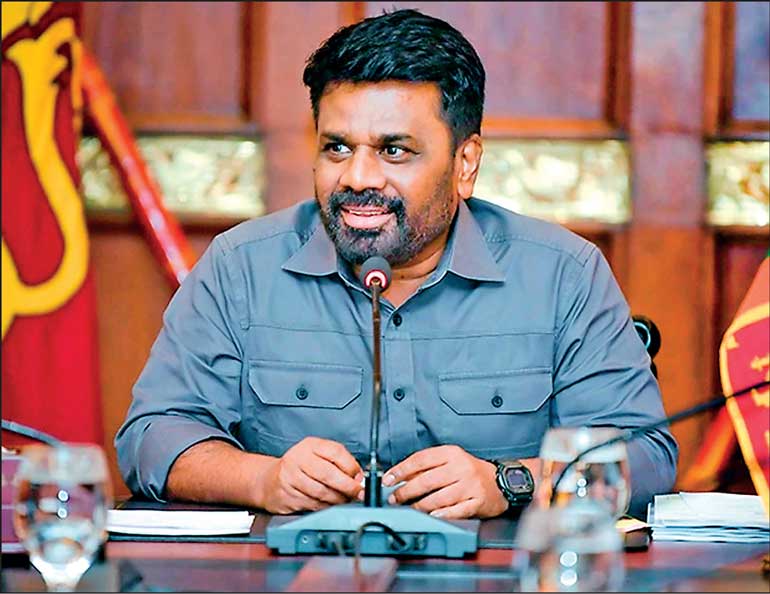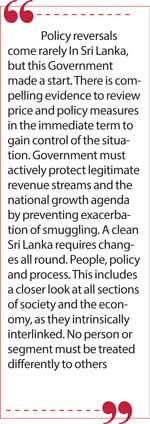Tuesday Feb 17, 2026
Tuesday Feb 17, 2026
Friday, 24 October 2025 00:00 - - {{hitsCtrl.values.hits}}

President Anura Kumara Disanayake
 By Kumar Ranaweera
By Kumar Ranaweera
Sri Lanka must consider a reset to reverse declining trends stemming from decades of narrow-minded policies. With fresh perspectives in hand, this Government holds power to drive change. In doing so it must strike swiftly to transform the social and economic order. With every passing moment an opportunity cost mounts the country can ill afford.
Governments gone by trumpeted white elephants as effective policy. They lacked courage and the will to tackle real issues. Effective systems were traded for those that gave passage to power and popularity. Politicisation of policy and the civil service resulted in the breakdown of social systems, economic foundations and even justice.
Such actions sidelined business and growth. This includes segments like the tobacco and alcohol industry that were considered harmful, and preventive strategies were adopted versus effective regulation. The tobacco industry suffered greater setbacks under regressive policy regimes, and the legitimate trade is now impacted, whilst the social security system buckles under an onslaught from the illegal trade. Over Rs. 80 billion is lost annually by the state due to over 1.2 billion illegal sticks entering Sri Lanka annually. The economic and human cost of bungled policy runs great.
Ignoring plain truths
The global tobacco trade provides clear empirical evidence of the unintended economic fallout from policy done wrong. This is established by reputed research agencies such as the Tax Foundation, which recently stated “poor tax policy is worsening cigarette smuggling in the European Union”. The Tax Foundation highlights how excessive and regressive tax levels made cigarette smuggling a lucrative criminal enterprise and created problems for many national Governments. Whilst some Governments choose to act on findings, Sri Lanka opted for the opposite. Due to excessive price, or tax, unregulated products now dominate 70% of this landscape, posing serious concerns over law and order.
The Tax Foundation writes: “higher tax rates incentivise smuggling. As tax rates increase, consumers and suppliers search for ways around costs. In cigarette markets, consumers shop across borders where rates are lower, and illicit market entrepreneurs develop black and grey markets to sell illegally to consumers.” For reasons best known to policymakers, Sri Lanka has ignored the growing presence of illicit and made way for the death of legitimate, taxable business. Parallel to Sri Lanka, countries such as France and Ireland with excessive tax regimes on tobacco products pose the highest concentration of smuggling in Europe. In France that’s 38.5% of market share.
Difficult outcomes
“Smuggling is notoriously difficult to measure, because illegal sales and tax avoidance are not well captured in Government or tax data,” writes the Tax Foundation. To estimate smuggling and illicit trade, KPMG conducts a discarded pack audit each year, collecting discarded cigarette packs, their report adds. In Sri Lanka, cigarettes are mostly sold in loose form, making it much harder to measure real illicit consumption. Despite increased detections many smuggled goods make their way into the market.
“Global illicit trade in tobacco is a growing problem driven by strong financial incentives. The consequences are far-reaching. Consumers face unsafe products that bypass health regulations, legitimate businesses struggle to compete with untaxed illegal goods, and Governments lose out on significant tax revenue. Worse still, smuggling operations involve corruption, money laundering, and terrorism.” Accordingly, the need to incorporate pragmatic regulatory and pricing regimes become imperative for countries looking to prevent deeper slides into anarchy.
The Tax Foundation report points to academic research that suggests a one-euro increase in tax per pack in the EU will increase illicit share by 5 to 12%. This translates to increased illicit cigarette sales by 29 to 95% on average. Similar studies in the US suggest a one-dollar increase in tax per pack increases smuggling by 13%. Sri Lanka is not removed from such proven global truths, and during this budget closely consider its current position of tax relative to the market situation.
A transformative Budget
As its first national fiscal policy presentation draws closer, it is opportune for the Government to reflect upon this reality. Excessive taxes and smuggling have a direct relationship. As alluded to before, there has been increased detections of contraband at Sri Lanka’s ports of entry, and fines imposed on offenders. However, there are far more being smuggled into the country than before, and some evade detection.
Policy reversals come rarely In Sri Lanka, but this Government made a start. There is compelling evidence to review price and policy measures in the immediate term to gain control of the situation. Government must actively protect legitimate revenue streams and the national growth agenda by preventing exacerbation of smuggling. A clean Sri Lanka requires changes all round. People, policy and process. This includes a closer look at all sections of society and the economy, as they intrinsically interlinked. No person or segment must be treated differently to others.
(The writer is Senior Manager at a research arm at a reputed global auditor, specialising in consumer and retail segments.)